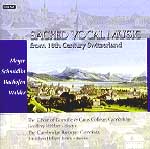In the notes to this well-performed and often musically intriguing recording, we’re reminded that “sadly, the study of western musical history does not spend a lot of time on the music of Switzerland.” An understatement to be sure, but as this program shows, at least where church music of the 18th century was concerned, Swiss composers derived virtually every structural device and stylistic mannerism from creative sources beyond their borders–Vienna, for instance, along with southern Germany and Italy. The lack of nationalistic distinction or even of one unique musical voice assures that the work of these very competent composers will be compared with that of their far more illustrious and influential contemporaries–Haydn and Mozart, for starters. Not surprisingly, Meyer, Schmidlin, Bachofen, & Walder come off most notably as fine technicians who provided their constituencies with functional, often colorful, even charming works that range from sturdy liturgical settings (Te Deum and Magnificat) to dramatic dialog.
Franciscus (Franz) Meyer’s Te Deum, as with almost all Te Deum settings, is long and wordy and employs all the 18th-century church music tricks of the trade, alternating chorus with a quartet of soloists and working to extend the harmonic progressions to dispatch the words as quickly as possible while avoiding the impression of repetitiveness. Bachofen’s Aria for soprano and bass (Schäfelein wo bleibst du doch?) offers the program’s most unique concept: nearly 12 minutes of dialogue between shepherd and lost sheep, complete with the shepherd’s frequent, pleading cries, “Schäf! Schäf! Schäf!” and the sheep’s corresponding “Wo! Wo! Ach!” More straightforward are the two little songs Drittes Morgen-Lied (Third Morning Song) and Auf meines Gottes treu (God’s faithfulness) by Johann Walder, gentle tunes with organ accompaniment, very prettily sung by Julia Doyle.
And so goes the program, continuing with a chorale-like trio and another extended Aria for two voices by Bachofen and concluding with Schmidlin’s substantial (nearly 15 minutes) Magnificat. This last shows a fair degree of refinement in the vocal writing if not much in the way of harmonic interest–and ultimately suffers from a dearth of compelling ideas to sustain its length. The world-class Gonville & Caius choir, as expected, gives full measure to these works and likewise the uniformly excellent soloists, all of whom realize that while this isn’t great music, it nevertheless is quite tuneful and easily singable–and with such a sincere, caring interpretive approach it serves its listeners well. The sound is pleasingly bright, the acoustic space nicely resonant while conveying an impressive clarity and vitality to the voices.
































